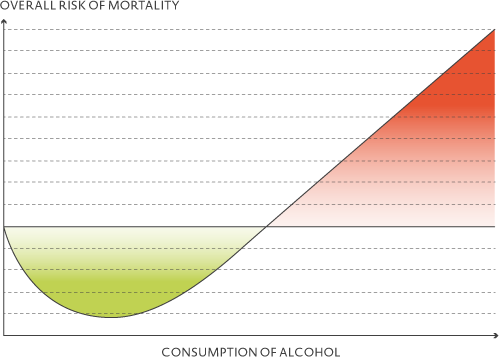The J Curve
Scientific studies show that consuming moderate quantities of wine protects against coronary disease in adults, mainly in men over 45 and postmenopausal women.
Regular, moderate wine consumption is associated with a decreased risk of mortality and boosts individual health. However, the risk increases drastically with every drink over and above the guidelines. Drinking more than recomended brings no benefits, and only harms one’s health.
This broad association has been accepted for decades and is known as the "J Curve".

Blessed red wine
Researchers continue to study the anti-oxidant properties present in black grapes. The effects of this action upon human health and well-being are extraordinary and can help to prevent:
• Cardiac aging
Resveratrol, a natural enzyme present in red wine, prolongs the life of the heart and imitates the effects of a calorie-restricted diet.
• Alzheimer
Strong anti-oxidants, polyphenols present in the skins and seeds of black grapes can help protect brain cells against aging.
• Bad cholesterol
Polyphenols also help prevent the formation of fatty plaque in the arteries, reducing the amount of bad cholesterol (LDL) and increasing good cholesterol (HDL).
• Kidney stones
In 1998, a team from Harvard (USA), directed by Gary Cuham, demonstrated a link between the daily consumption of red wine and a 59% reduction to the risk of forming kidney stones.
• Rheumatoid arthritis
Swedish researchers have concluded that drinking five glasses of red wine a week cuts the risk of developing this disease in half.
• Prostate cancer
Men that drink four or more glasses of red wine per week (without exceeding the guidelines for consumption) reduce the risk of suffering from this type of tumour by 50%. Once again, this seems to be due to the resveratrol.